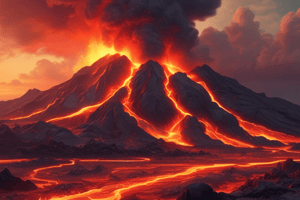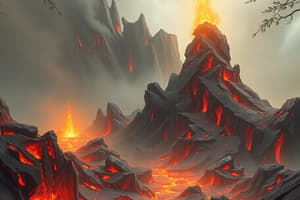Podcast
Questions and Answers
What primarily provides the raw materials for sedimentary rocks?
What primarily provides the raw materials for sedimentary rocks?
- Weathering and erosion (correct)
- Nuclear reactions
- Metamorphic processes
- Volcanic activity
Which class of sedimentary rocks is formed from cemented shells of organisms?
Which class of sedimentary rocks is formed from cemented shells of organisms?
- Biochemical (correct)
- Organic
- Clastic
- Chemical
In which part of the Earth's structure do sedimentary rocks primarily form?
In which part of the Earth's structure do sedimentary rocks primarily form?
- Core
- Mantle
- Uppermost crust (correct)
- Middle crust
Which process is NOT classified as a type of weathering?
Which process is NOT classified as a type of weathering?
What distinguishes organic sedimentary rocks from other types?
What distinguishes organic sedimentary rocks from other types?
Which type of weathering involves the alteration or destruction of minerals by chemical reaction?
Which type of weathering involves the alteration or destruction of minerals by chemical reaction?
What is primarily the outcome of physical weathering?
What is primarily the outcome of physical weathering?
Which of the following processes is NOT part of sedimentation?
Which of the following processes is NOT part of sedimentation?
What factor decreases the viscosity of lava?
What factor decreases the viscosity of lava?
Which type of volcano is most likely formed by low-viscosity lava?
Which type of volcano is most likely formed by low-viscosity lava?
What is a characteristic of high-viscosity lava?
What is a characteristic of high-viscosity lava?
Which factor contributes to the formation of composite/stratovolcanoes?
Which factor contributes to the formation of composite/stratovolcanoes?
What primarily influences the explosiveness of a volcanic eruption?
What primarily influences the explosiveness of a volcanic eruption?
Which statement is true about mafic lava?
Which statement is true about mafic lava?
What type of metamorphism occurs at a pluton?
What type of metamorphism occurs at a pluton?
What is a primary characteristic of hotspot volcanoes?
What is a primary characteristic of hotspot volcanoes?
Which type of lava is likely to cause more explosive eruptions?
Which type of lava is likely to cause more explosive eruptions?
Which metamorphic rock is typically produced in a subduction zone?
Which metamorphic rock is typically produced in a subduction zone?
Why do high-grade metamorphic rocks not undergo retrograde metamorphism?
Why do high-grade metamorphic rocks not undergo retrograde metamorphism?
What is the main difference between contact metamorphism and subduction zone metamorphism?
What is the main difference between contact metamorphism and subduction zone metamorphism?
What mineral is commonly associated with blueschist?
What mineral is commonly associated with blueschist?
Which type of metamorphic rock is likely to form from limestone?
Which type of metamorphic rock is likely to form from limestone?
What process brings high-grade metamorphic rocks to the Earth's surface?
What process brings high-grade metamorphic rocks to the Earth's surface?
What defines a mountain range?
What defines a mountain range?
What type of fault forms under tensional stress?
What type of fault forms under tensional stress?
In which setting are thrust (reverse) faults most commonly found?
In which setting are thrust (reverse) faults most commonly found?
What movement characterizes strike-slip faults?
What movement characterizes strike-slip faults?
What describes an anticline on a geological map?
What describes an anticline on a geological map?
Which of the following defines a syncline?
Which of the following defines a syncline?
What happens to a fold when it becomes overturned?
What happens to a fold when it becomes overturned?
What type of stress leads to the formation of both anticlines and synclines?
What type of stress leads to the formation of both anticlines and synclines?
Which characteristic distinguishes symmetrical folds from asymmetrical folds?
Which characteristic distinguishes symmetrical folds from asymmetrical folds?
What characterizes a mature sedimentary rock such as sandstone?
What characterizes a mature sedimentary rock such as sandstone?
What is the primary cause of regional metamorphism?
What is the primary cause of regional metamorphism?
Which type of metamorphism involves high pressure and low temperature conditions?
Which type of metamorphism involves high pressure and low temperature conditions?
How do metamorphic rocks form?
How do metamorphic rocks form?
What best describes the process of orogenesis?
What best describes the process of orogenesis?
What characteristic is indicative of metamorphic rocks?
What characteristic is indicative of metamorphic rocks?
Under which condition do dynamic metamorphic rocks typically form?
Under which condition do dynamic metamorphic rocks typically form?
Which metamorphism type is caused by interaction with hot fluids?
Which metamorphism type is caused by interaction with hot fluids?
What is the primary feature of thermal metamorphism?
What is the primary feature of thermal metamorphism?
Which metamorphic process can lead to the formation of blue minerals?
Which metamorphic process can lead to the formation of blue minerals?
Flashcards are hidden until you start studying
Study Notes
Viscosity & Volcanoes
- Viscosity is the resistance of a fluid to flow: hotter lava is less viscous, meaning it flows easily.
- Factors influencing viscosity:
- Temperature: Hotter lava is less viscous, cooler lava is more viscous.
- Volatile elements: High gas content makes lava more explosive BUT less viscous.
- Silica content: More silica means a higher viscosity.
- Low viscosity (mafic):
- Hotter lava
- High gas content
- Produces shield volcanoes with broad, gentle slopes due to lava spreading out over wide areas.
- High Viscosity (felsic):
- Cooler lava
- Less gas content
- Produces composite/stratovolcanoes with steeper profiles, susceptible to explosive eruptions due to pressure build-up.
Sedimentary Rocks
- Form in the uppermost part of the crust, covering igneous and metamorphic basement rocks.
- Formation:
- Weathering: Physical breakdown of preexisting rocks.
- Erosion: Transportation of weathered material.
- Deposition: Settling of weathered material.
- Classes:
- Clastic: Cemented fragments of broken rocks.
- Biochemical: Cemented shells of organisms.
- Organic: Carbon-rich remains of organisms.
- Chemical: Minerals crystallizing directly from water.
Metamorphism
- Rocks transformed by intense heat or pressure without melting.
- Factors influencing metamorphism:
- Protolith (parent rock): Starting material, can be igneous, sedimentary, or another metamorphic rock.
- Perturbation:
- Pressure: Influences the arrangement of minerals.
- Temperature: Drives chemical reactions and recrystallization.
- Fluids: Can enhance chemical reactions.
- Changes:
- Texture, mineralogy, grain size, and shape may change.
- Types:
- Regional: Occurring over broad areas due to tectonic movement.
- Thermal: Resulting from heat intrusion from magmatic activity (high T, low P).
- Dynamic: In fault or shear zones, variable pressure and temperature conditions.
- Burial: Under pressure from overlying sediments in sedimentary basins.
- Hydrothermal: Rocks interacting with hot fluids.
- Shock: Extreme pressure caused by impacts.
Orogenesis (Mountain Building)
- Continental plates collide, causing crustal thickening.
- Regional Metamorphism: Intense pressure and temperature lead to widespread metamorphic rock formation.
- Subduction Zone Metamorphism: High pressure, but low temperature.
- Cold oceanic crust is subducted, driving metamorphic reactions leading to mineral density increase.
- "Slab pull" force sustains plate sinking.
- Blue minerals often form.
Deformation
- The process of changing the shape and structure of rocks.
- Faults: Fractures in rocks where there has been movement.
- Normal Faults: Form under tensional stress, hanging wall moves down relative to footwall.
- Thrust (Reverse) Faults: Form under compressional stress, hanging wall moves up, creating overlap.
- Strike-Slip Faults: Form under shear stress, two blocks move horizontally past each other.
- Folds: Bends in rock layers.
- Anticline: Rock layers bend upwards into an arch, often forming in mountain ranges.
- Syncline: Rock layers bend downwards into a trough, also formed by compressional stress.
Mountain Building & Exhumation
- High-grade metamorphic rocks are brought to the surface by uplift and erosion during tectonic processes (exhumation).
- Retrograde Metamorphism: May not occur because the lack of fluids and cooling prevent reverse reactions.
- Minerals formed at high temperature remain stable as rocks cool.
Map Representation
- Anticline: Appears as parallel lines on a map, oldest layers at the center, youngest layers outward.
- Syncline: Appears as parallel lines on a map, youngest layers at the center, oldest layers outward.
- Plunging Fold: Appears as a series of v-shapes on a map:
- Anticline plunges toward the nose (closed end).
- Syncline plunges away from the nose.
Studying That Suits You
Use AI to generate personalized quizzes and flashcards to suit your learning preferences.




